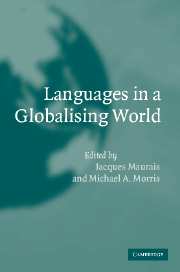21 - The search for a global linguistic strategy
Published online by Cambridge University Press: 18 November 2009
Summary
The era that ended with the collapse of communism has given way to an era of globalisation, the term of choice to describe the changes observed in the world over the past ten or a dozen years. Broadly speaking, there are two ways of looking at the phenomenon of globalisation: as interconnectedness or as expansion. The first tends to be sympathetic to the USA, the second opposed. According to the former model, the various independent economies across the world, aided by technological advances and resulting improvements in communication, have come together to form economic and financial networks, allowing for greater flow of capital (including human capital) across national boundaries, greater integration of markets and the emergence of extra-governmental transnational structures in the form of global corporations. Such structures, the argument goes, promote dense communication networks and financial interdependencies that not only improve the standard of living in many countries, but also serve to promote peace by creating shared interests. Thomas Friedman, author of The Lexus and the Olive Tree (1999), has pointed out that countries endowed with McDonalds franchises do not go to war with one another. By-products of this new world order and major contributors to the growth of a world polity are non-governmental organisations whose reach goes beyond the parochial interests of individual states (Boli and Thomas 1999), worldwide concern for human rights that is much less inhibited by national boundaries than it once was, ease of international travel as restrictions on the free movement of persons are reduced, and a growing integration of both scientific research and advanced education.
- Type
- Chapter
- Information
- Languages in a Globalising World , pp. 319 - 333Publisher: Cambridge University PressPrint publication year: 2003
- 9
- Cited by



